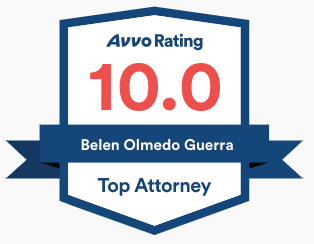Is the state of Arizona charging you with online solicitation of a minor?
Online solicitation of a minor in Arizona falls under the state’s sexual exploitation laws. In turn, Arizona’s sexual exploitation laws are a subset of the state’s child pornography laws. These laws are some of the harshest in the country. Prosecutors and judges often pursue maximum penalties in these cases.
In this post, Phoenix sex crimes attorney Belen Olmedo Guerra will answer all your questions regarding Arizona sexual exploitation charges, as well as possible legal defenses.
What is Sexual Exploitation of a Minor in Arizona?
Online solicitation of a minor falls under Arizona’s sexual exploitation laws. Arizona can charge you with sexual exploitation of a minor if you knowingly:
- Record, film, photograph, develop, or duplicate any visual depiction of a minor engaged in sexual conduct.
- Distribute, transport, exhibit, receive, sell, purchase, electronically transmit, possess, or exchange any visual depiction of a minor engaged in sexual conduct.
In short, if you possess, create, or distribute child pornography, Arizona can charge you with sexual exploitation of a minor.
What is Online Solicitation of a Minor in Arizona?
But online solicitation of a minor doesn’t always involve child pornography. Even asking for explicit images of a minor or sexting in Arizona is illegal under the state’s sexual exploitation laws. Arizona labels online solicitation of a minor as “luring a minor for sexual exploitation.”
For instance, say a defendant is chatting online with someone they know or believe is under the age of 18. If the defendant solicits or offers sexual conduct with that person, they can face online solicitation, or “luring a minor” charges. The state defines sexual conduct as sexual intercourse or oral sexual contact.
Even if no sexual contact actually occurs, or if no explicit images are created or transmitted, the act of asking is a Class 3 felony in Arizona.
Aggravated Online Solicitation of a Minor in Arizona
Online solicitation of a minor becomes aggravated under Arizona law when the defendant does both of the following:
- Uses an electronic communication device to knowingly transmit at least one explicit (content that the state defines as ‘harmful to minors’) image to someone they know or believe is under 18 or the purpose of initiating communication with that minor, and
- By means of that communication, offers or solicits sexual conduct with the minor. The offer or solicitation can occur before, at the same time as, or after the transmission of the explicit image.
For example, say that a person uses a phone, tablet, or computer to send content that is harmful to minors to someone they know or believe is a minor. They are fully aware that the content is sexually explicit and harmful to minors. They use the image or visual depiction to initiate or engage in sexual conduct with the minor. This can include asking the minor to meet them in person for sexual conduct or asking the minor for explicit content in return. This offense is a Class 2 felony.
What Content is Harmful to Minors?
In order for aggravated online solicitation of a minor to take place, a person must transmit content that is “harmful to minors”. But what does that mean?
Under A.R.S. 13-3506, Arizona defines content that is harmful to minors as descriptions or representations of nudity, sexual activity, sexual conduct, sexual excitement, or sadomasochistic abuse.
What Are The Penalties for Online Solicitation of a Minor?
Online solicitation of a minor is a Class 3 felony in Arizona.
For a first-offense Class 3 felony, consequences can range from two to eight years in prison, as well as extensive fines and court fees. These are serious charges, with extensive penalties.
When the charge becomes aggravated, it becomes a Class 2 felony. The consequences of a Class 2 felony range from five to twelve years in prison.
These penalties are only for a first offense. If the defendant has prior felony convictions, potential prison time increases drastically.
Dangerous Crimes Against Children
If the minor in question is under the age of 15, online solicitation falls under Arizona’s “Dangerous Crimes Against Children.” A DCAC crime carries the following punishment for each and every conviction:
- Anywhere from five to fifteen years of prison time, and
- If the defendant has prior serious felony convictions, they may face anywhere from eight to twenty-two years in prison.
Under Arizona’s DCAC law, a defendant must serve all their prison time before becoming eligible for release. If there are multiple counts, the defendant must serve the sentences for these crimes consecutively rather than concurrently. Thus, if a judge sentences a defendant to 10 years in prison for two counts of online solicitation of a minor, the defendant must serve 20 years in prison.
A conviction will also require the defendant to register as a sex offender for the rest of their life.
What Are The Possible Legal Defenses For Online Solicitation of a Minor?
Many arrests in online solicitation cases occur after an elaborate sting operation by law enforcement. What this entails is a police officer posing as a minor online. If anyone solicits or offers sexual conduct with the undercover police officer, the state can charge that person with online solicitation.
In these cases, defendants may believe that the fact that they were never in contact with a minor is a defense. But the actual text of the statute that deals with online solicitation excludes this as a defense.
It does not matter that the defendant was never in contact with a minor. If they believed they were in contact with someone under the age of 18, they have committed online solicitation of a minor.
Lack of Intent
The most successful defenses for crimes of this nature involve demonstrating a lack of intent to go through with the sex act.
In order to get a conviction, the prosecution must prove that the defendant intended to engage in sexual conduct with the minor, and did not intend to meet with the minor for any other reason.
For instance, take a defendant that the state charges with online solicitation crimes. Police arrested this defendant after the defendant made plans online to meet with someone they believed was a minor. If the defendant never had a sexually explicit conversation with the person they believed was a minor, or never asked them to engage in sexual conduct, a Phoenix criminal defense attorney can use lack of intent as a defense. It is not illegal to make plans to meet with a minor for purposes that are not sexual.
Contact the Belen Law Firm Today
Belen Olmedo Guerra is an experienced sex crimes attorney in the Phoenix, Arizona area. If you or someone you love is facing sexual exploitation or online solicitation charges in Arizona, call the Belen Law Firm at 602-715-0908 for a free initial consultation. You can also leave us a message on our website.






















